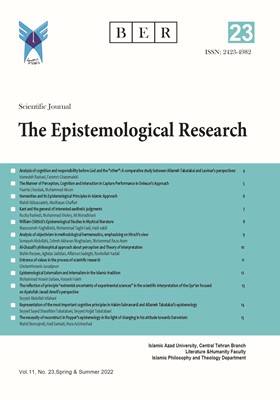دریچههای ورود ارزشها به سیر پژوهش علمی
الموضوعات : پژوهشهای معرفت شناختی
1 - گروه کلام، موسسه حکمت و فلسفه ایران
الکلمات المفتاحية: روش, عینیت, ارزش و دانش, سیر پژوهش علمی,
ملخص المقالة :
ارزیابی جواز یا عدم جواز تأثیر ارزشهای غیرعلمی در فرآیند دانش و پیامدهای آن در چند دهه اخیر به مسألهای مهم در فلسفه علم تبدیل شده و ادله فراوانی در دفاع یا رد این اثرگذاری بیان شده است. یکی از مقدمات تحلیل این مسأله، تبیین سیر پژوهش علمی و ترسیم زمینهها و منافذ دخالت ارزشها است. به نظر میرسد هر فعالیت علمی دارای سه بخش کلان مدخل، فرآیند اصلی (مقدماتی و استنتاج) و کاربرد است که هر یک شامل چند مرحله جزئیتر میشود و دخالت دادن ارزشهای غیرعلمی میتواند در انتخابها و ترجیحها و درنتیجه در سرنوشت فعالیت علمی مؤثر باشد. دو مرحله پیشین و پسین علم اغلب ارزشبار است و این دخالتی در رسالت فعالیت علمی، یعنی عینیت علمی ندارد. مرحله میانی و اصلی فعالیت علمی در مواردی همچون تحلیل دادهها، انتخاب روش، وزندهی شواهد و گزینش فرضیه، آبستن تأثرپذیری از ارزشها است و استدلالها در عدم جواز دخالت ارزشها نیز ناظر به لغزش سیر علمی در این مراحل و دوری از عینیت علم و ذهنی و شخصی شدن آن است. در این پژوهش با تقسیم سیر پژوهش علمی به سه مرحله، نحوه دخالت ارزشهای غیرعلمی ترسیم شده و نشان داده شده است که علم در بخشهای مختلفی مستعد اثرپذیری از ارزشهای غیرعلمی است؛ حال اینکه این اثرگذاری و اثرپذیری به لحاظ هنجاری تا چه اندازه مجاز باشد، بحثی ثانوی است.
استیونسن، لزلی و بایرلی، هنری، 1393، هزار چهره علم، ترجمه میثم محمدامینی، تهران، فرهنگ نشر نو.
اسلامی، سیدحسن، 1390، «درآمدی بر اخلاق پژوهش»، در: اخلاق پژوهش، مبانی و مسائل، تهران، پژوهشگاه علوم انسانی.
پوپر، کارل، 1397، حدسها و ابطالها، ترجمه رحمتالله جباری، تهران، شرکت سهامی انتشار.
پوپر، کارل، 1372، واقعیگرى و هدف علم، ترجمه احمد آرام، تهران، سروش.
رشر، نیکلاس، 1390، «ابعاد اخلاقی پژوهش علمی»، در: اخلاق پژوهش، مبانی و مسائل، تهران، پژوهشگاه علوم انسانی.
رولین، برنارد، 1394، علم و اخلاق، ترجمه سعید عدالتجو، تهران، انتشارات علمی فرهنگی.
رووت، مایکل، 1389، فلسفه علوم اجتماعی، روشها، آرمانها و سیاستهای پژوهش اجتماعی، تهران، پژوهکشده مطالعات فرهنگی و اجتماعی.
سروش، عبدالکریم، 1388، تفرج صنع، تهران، صراط.
سروش، عبدالکریم، 1385، درسهایی در فلسفه الاجتماع، تهران، نشر نی.
Andersen, Hanne, 2015, Scientific Method, Stanford Encyclopedia of Philosophy.
Biddle, Justin, 2013, “State of the field: Transient Underdetermination and Values in Science”, Studies in History and Philosophy of Science, 44 (2013) 124–133.
Brown, M. J.2019, “Is Science Really Value Free and Objective? From Objectivity toScientific Integrity” in: What Is Scientific Knowledge?, ed. by K. McCain and K. Kampourakis, New York, NY: Routledge.
Douglas, Heather, 2000, Inductive Risk and Values in Sience, Philosophy of Science, 67:559–79.
Douglas, Heather , 2009, Science, Policy, and the Value-Free Ideal, University of Pittsburgh Press.
Dupré, J., 2007, “Fact and Value”, in H Kincaid and J Dupré (eds.), Value‐free science? Ideals and illusions, Oxford University Press.
Eekels, Johannes, 1995, Values, Objectivity and Subjectivity in Science and Engineering, Journal of Engineering Design, 6:3, 173-189.
Foley, Richard, 1993, Working Without a Net: A Study of Egocentric Epistemology, NewYork: Oxford University Press.
Goldman, Alvin, 1986, Epistemology and Cognition, Cambridge, MA: Harvard University Press.
Greco, John, 2011,The Value Problem, The Routledge Companion to Epistemology,
Hempel, Carl, 1965, “Science and Human Values.” In Aspects of Scientific Explanation, New York: Free Press.
Kitcher, P., 2011, Science in a Democratic Society, New York: Prometheus Books.
Kitcher, p., 1993, The Advancement of Science, New York, Oxford University Press.
Lacey, H. 1999, Is Science Value-Free? Values and Scientific Understanding, New York, Routledge.
Koertge, Noretta, 2000, “Science, Values, and the Value of Science “, Philosophy of Science, 67, S45-S57.
Longino, Helen, 1990, Science as social knowledge. Princeton, NJ: Princeton University Press
Mitchell, S., 2004, “The Prescribed and Proscribed Values in Science Policy,” in Peter Machamer and Gereon Wolters (eds), Science, Values, and Objectivity, Pittsburgh, University of Pittsburgh Press.
Machamer, Peter and Douglas, Heather, 1998, “How values are in science”, Critical Quarterly, vol. 40, no. 2, p. 32.
McMullin, Ernan, 1983, “Values in science”, in Proceedings of the 1982 biennial meeting of the Philosophy of Science Association, vol. 1, MI: Philosophy of Science Association
Nagel, E., 1961, The Structure of Science: Problems in the Logic of Scientific Explanation, New York, Harcourt, Brace & World, Inc.
Plantinga, Alvin, 1997, Faith and Rationality: Reason and Belief in God, Notre Dame: University of Notre Dame Press.
Pritchard, Duncan, 2014, what is this thing called knowledge?, London and New York, Routledge.
Rooney, P., 1992, “On Values in Science: Is the Epistemic/Non-Epistemic Distinction Useful?”, PSA: Proceedings of the Biennial Meeting of the Philosophy of Science Association, v. 1, p. 13-22.
Sharpe, Eric J., 2010, “The Study of Religion in Historical Perspective”, in The Routledge Companion to the Study of Religion, ed. John R. Hinnells, London and New York, Routledge.
Stenmark, M, 2005, “A Religiously Partisian Science?”, in Theology and Science, v. 3, p. 23-38.
Sosa, Ernest, 1991, “Knowledge and Intellectual Virtue”, in Knowledge in Perspective: Selected ssays in Epistemology, Cambridge, Cambridge University Press.
Steel, Daniel, 2010, “Epistemic Values and the Argument from Inductive Risk”, Philosophy of Science, v. 77. No. 1.
_||_

